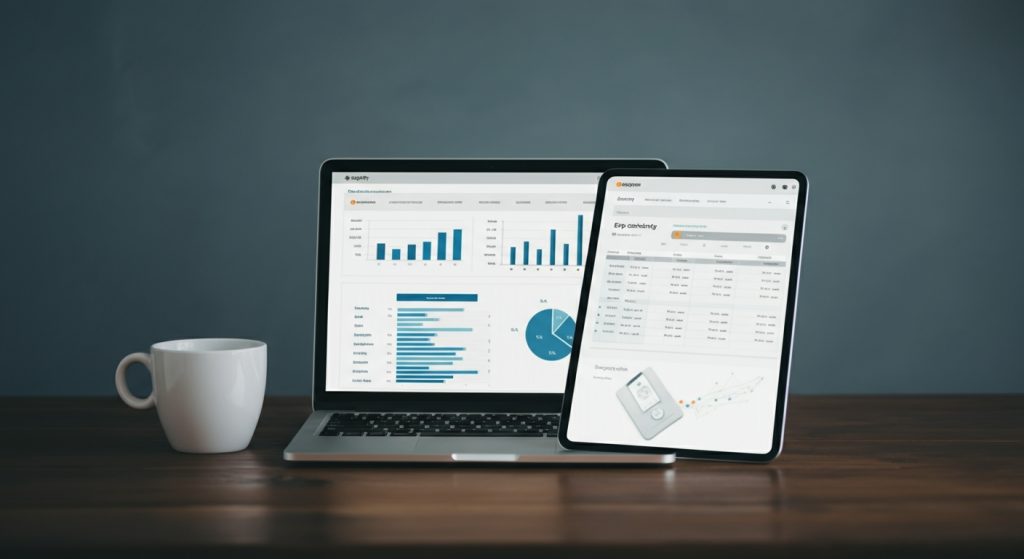Introduction
Many Zimbabwean businesses start their journey with a simple accounting system like Sage Pastel, QuickBooks, or even Excel. These tools help manage basic finance tasks—like issuing invoices, tracking expenses, and preparing tax returns.
But as your business grows, managing just the numbers isn’t enough. You need control over:
- Stock and inventory
- Payroll and HR
- Sales and customer data
- Procurement and supply chain
- Projects and operations
That’s where an ERP (Enterprise Resource Planning) system steps in.
So, what’s the difference between an ERP and an accounting system, and how do you know when it’s time to upgrade?
Let’s break it down.
1. What Is an Accounting System?
An accounting system is software that helps businesses track financial transactions. It focuses on:
- Invoicing
- Payments and receipts
- Profit and loss reporting
- Bank reconciliations
- Tax and statutory filings
Popular examples in Zimbabwe include:
- QuickBooks
- Sage Pastel
- Wave
- Excel templates
Best for: Small businesses with limited operations and one or two users handling finances.
2. What Is an ERP System?
An ERP system is a complete business management platform that connects and automates multiple departments in one place. It includes:
- Accounting
- Inventory management
- Procurement
- Payroll and HR
- Customer Relationship Management (CRM)
- Manufacturing or project tracking
- Reporting and analytics
Popular ERPs in Zimbabwe include:
- Odoo
- SAP Business One
- Zoho One
- Sage 300
- Palladium
Best for: Growing businesses that need more than just accounting.
3. Key Differences Between ERP and Accounting Software
| Feature | Accounting System | ERP System |
| Primary Function | Financial tracking | Complete business management |
| Users | Finance team only | All departments (HR, Sales, etc.) |
| Stock & Inventory | Basic tracking or add-ons | Advanced, real-time control |
| Payroll & HR | Often missing or external | Fully integrated |
| Multi-Department Integration | Not supported | Core feature |
| Real-Time Dashboards | Limited | Built-in and customisable |
| Automation | Limited to invoices and journals | Full workflows and alerts |
| Scalability | Limited to small teams | Designed to grow with the business |
4. Real-Life Example: Zimbabwean Use Case
Case Study:
A Harare-based wholesale company used QuickBooks for years to manage sales and accounting. But as the business grew, issues began:
- Stock records didn’t match physical counts
- HR was using Excel to manage salaries
- Customer orders were delayed due to manual tracking
- Sales reps couldn’t access real-time pricing or availability
They switched to an ERP (Odoo), which gave them:
- Integrated accounting, stock, and sales
- Automatic invoicing linked to stock movements
- Payroll and leave tracking
- Real-time dashboards for management
Now, they have fewer errors, faster turnaround, and better decision-making.
5. Which One Does Your Business Need?
Choose an Accounting System if:
- You’re a small business or startup
- You only need to manage basic finances
- You don’t deal with complex inventory or HR
- Your business runs on a single branch with low user access
- Cost is your biggest concern right now
Choose an ERP System if:
- You manage multiple products, warehouses, or locations
- You want to connect accounting with sales, HR, and inventory
- You need automation to reduce manual work
- You want data-driven insights and reports
- You plan to scale your operations
6. Benefits of Upgrading to ERP
- Improved Accuracy: No more double entries across departments
- Better Collaboration: Teams work in one system
- Faster Operations: Sales, procurement, and accounting sync instantly
- Compliance: Easier ZIMRA reporting, NSSA payroll, and NEC calculations
- Remote Access: Many ERP systems are cloud-based and mobile-friendly
7. Cost Comparison
| Expense Type | Accounting System | ERP System |
| Initial Setup | Low (sometimes free) | Medium to High (once-off or monthly) |
| Users | Usually limited | Scalable (add more users anytime) |
| Support | Basic or self-help | Dedicated local consultants |
| ROI (Long-Term) | Limited | High with operational efficiency |
While ERP costs more upfront, the long-term savings and business control make it worth the investment—especially for growing companies.
Conclusion
Accounting systems are great for keeping your books in order. But once your business starts growing—adding staff, branches, or product lines—you need more than just numbers.
An ERP system connects your entire operation, reduces waste, and gives you full visibility into your business health.




